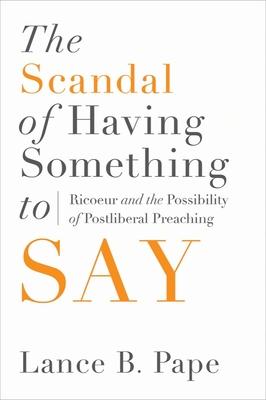The Christian sermon--once the chief symbol of authority in Western culture--often appears in the postmodern imagination as synonymous with irrelevancy, biased judgment, and a rejection of absolute truth. While Christian preachers mourn the cultural disintegration of their hallowed practice, Lance B. Pape believes this modern turn enables the preacher to rediscover the sermon. Proclaiming the gospel, he contends, lies not in the cultural acceptance of the message but in God's free act of self-communication. Using Karl Barth's theology of the Word, Hans Frei's hermeneutical method, and, chiefly, Paul Ricoeur's theory of narrative as threefold mimesis, Pape develops a homiletic that recaptures the scandalous intent of the gospel. The Scandal of Having Something to Say then casts the post-liberal preacher as a "surrogate reader" of the biblical text on behalf of the congregation and opens new avenues for practice through the analysis and critique of two sermons.

The Scandal of Having Something to Say: Ricoeur and the Possibility of Postliberal Preaching
The Christian sermon--once the chief symbol of authority in Western culture--often appears in the postmodern imagination as synonymous with irrelevancy, biased judgment, and a rejection of absolute truth. While Christian preachers mourn the cultural disintegration of their hallowed practice, Lance B. Pape believes this modern turn enables the preacher to rediscover the sermon. Proclaiming the gospel, he contends, lies not in the cultural acceptance of the message but in God's free act of self-communication. Using Karl Barth's theology of the Word, Hans Frei's hermeneutical method, and, chiefly, Paul Ricoeur's theory of narrative as threefold mimesis, Pape develops a homiletic that recaptures the scandalous intent of the gospel. The Scandal of Having Something to Say then casts the post-liberal preacher as a "surrogate reader" of the biblical text on behalf of the congregation and opens new avenues for practice through the analysis and critique of two sermons.